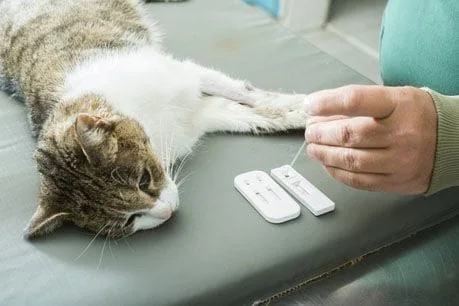Blood tests are an essential part of diagnosing what is ailing your pet, just as they are in human medicine. Blood tests can tell the veterinarian a myriad of things, from whether your pet is dehydrated to whether he or she has anemia to whether your cat or dog is suffering from a condition such as Kidney disease.
Common blood tests used by veterinarians
Our most common blood tests for dogs would be their annual Heartworm Test which tests for 4 different mosquito spread diseases. This test requires a small amount of blood and can be processed in house. In most cases results are available in 10 minutes. The Feline Combo Test is a test that checks for Feline Immunodeficiency Virus (feline AIDS) and Feline Leukemia. As with the canine Heartworm test, results are available in house in about 10 minutes. Many other lab panels are run on a daily basis both in house, and with our outside lab. These panels are typically chemistry panels that will indicate the health of certain organs based on results, or give us hormone or enzyme levels in some cases. If the doctor recommends running lab work, we are happy to provide an estimate of cost at the client's request.
Dr. Bremner firmly believes in the benefits of running routine blood work so that we have a baseline if your pet were to become ill at some point in the future. Knowing when a problem starts can be key in getting treatment started swiftly. Although most young pets do not need lab work, we do recommend a pre-surgical panel for any procedures such as spaying, or dentals. As your pet ages we may require a small panel to monitor your pet's kidneys and liver if they are on any NSAIDs or other medications with known side affects to the organs. These tests help us to adjust dosages of current medications and in some cases will alert us for the need to start new medications or implement diet changes
Not all diagnostics require a blood sample
We are happy to have the ability to process several different types of samples within the hospital such as skin scraping to diagnose things like Demodex mites, or mange, fine needle aspirates to help us figure out what that lump is on your pet, ear swabs to diagnose ear infections, and fecal samples to check for several different intestinal parasites. These tools are helpful to us in diagnosing and treating your pet for whatever ails them.
